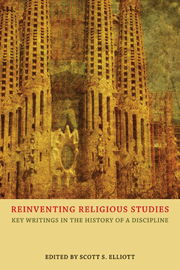Book contents
- Frontmatter
- Contents
- Introduction
- 1 For such a time as this: the Council of Societies for the Study of Religion, 1969–2009
- Part I Inventing and reinventing the field of religious studies
- Part II Method and theory in religious studies
- Part III Teaching religion
- 14 Confessions of a former establishment fundamentalist
- 15 Confessing away the soul with the sins, or the risks of Uncle Tomism among the humanists: a reply to Robert Bellah
- 16 Criteria for organizing the introductory course in religion
- 17 Teaching about religion at the state university: taking the issue seriously and strictly
- 18 Teaching about religion at the state university: a reply
- 19 Teaching about religion at the religiously affiliated university: taking the issue seriously and strictly—a reply to Robert Baird and Robert Minor
- Part IV Women and the bible in religious studies
- Part V Religion and religious studies in civic life
- Part VI Religious studies and identity politics
- Part VII Islam and 9/11
- Bibliography
- Acknowledgments
- Index
14 - Confessions of a former establishment fundamentalist
from Part III - Teaching religion
- Frontmatter
- Contents
- Introduction
- 1 For such a time as this: the Council of Societies for the Study of Religion, 1969–2009
- Part I Inventing and reinventing the field of religious studies
- Part II Method and theory in religious studies
- Part III Teaching religion
- 14 Confessions of a former establishment fundamentalist
- 15 Confessing away the soul with the sins, or the risks of Uncle Tomism among the humanists: a reply to Robert Bellah
- 16 Criteria for organizing the introductory course in religion
- 17 Teaching about religion at the state university: taking the issue seriously and strictly
- 18 Teaching about religion at the state university: a reply
- 19 Teaching about religion at the religiously affiliated university: taking the issue seriously and strictly—a reply to Robert Baird and Robert Minor
- Part IV Women and the bible in religious studies
- Part V Religion and religious studies in civic life
- Part VI Religious studies and identity politics
- Part VII Islam and 9/11
- Bibliography
- Acknowledgments
- Index
Summary
Living in the most disturbed institution in a society which shows all the signs of acute cultural and social crisis is not very comfortable. It does, however, present great opportunities if we can take advantage of them. The present generation of students is not inclined to accept anything without question. We all have some experience of what that means in the realm of politics. In the field of religion, though, the consequences are somewhat curious.
The establishment view of religion in American universities today is what I have called “enlightenment fundamentalism.” This is the view that science and historical scholarship have effectively disposed of fallacious religious beliefs. If the study of religion has any place in the university at all, which is doubtful to enlightenment fundamentalists, it is to disclose the true reasons why religious believers have been so misguided. The present student generation is not at all prepared to accept these presuppositions. In fact many students feel that there is probably more of importance in primitive shamanism than in all the cut-and-dried rationality that college professors serve up to them. Indeed there are people on every major campus in America practicing magic at this very moment.
As with every other aspect of our present situation this one is full of danger and of possibility. Let me be a bit autobiographical in indicating how I have tried to cope with it.
- Type
- Chapter
- Information
- Reinventing Religious StudiesKey Writings in the History of a Discipline, pp. 91 - 94Publisher: Acumen PublishingPrint publication year: 2013



